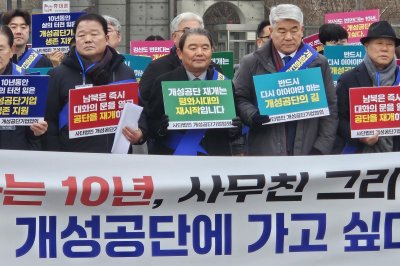Court orders Trump administration to facilitate deported student’s return | Donald Trump News
A United States court has ordered the administration of President Donald Trump to facilitate the return of a Babson College student, Any Lucia Lopez Belloza, who was wrongfully deported last year.
In his ruling on Tuesday, US District Judge Richard Stearns gave the government two weeks to take steps to bring Lopez Belloza back.
Recommended Stories
list of 3 itemsend of list
He framed the order as an opportunity to correct a “mistake” – but he did not rule out holding the government in contempt if it failed to take the necessary actions.
“Wisdom counsels that redemption may be found by acknowledging and fixing our own errors,” Stearns wrote.
“In this unfortunate case, the government commendably admits that it did wrong. Now it is time for the government to make amends.”
A surprise trip turned deportation
Lopez Belloza, 19, was arrested on November 20 by immigration agents at Boston’s Logan airport.
The college freshman had been preparing to board a flight home to her family in Texas to surprise them for the Thanksgiving holiday.
She has since told The Associated Press news agency that she was denied access to a lawyer after her initial detention at the airport. The immigration agent told her she would need to sign a deportation document first, according to Lopez Belloza, who said she denied the offer.
For the next two nights, she said she was kept by Immigration and Customs Enforcement (ICE) in a holding room with 17 other women, without enough room to lie down.
Then, she was loaded onto a deportation flight, which took her to Texas, then to her native Honduras, on November 22.
“I was numb the whole plane ride,” Lopez Belloza told the AP. “I just kept questioning myself. Why is it happening to me?”
Her lawyers, however, had obtained during that time a court order barring her removal from Massachusetts for 72 hours. Lopez Belloza’s deportation violated that court order.
She has remained in Honduras for the last two and a half months, while legal challenges over her case proceeded.

A legal battle
In court, the Trump administration has apologised for the error in Lopez Belloza’s case, acknowledging that a mistake was indeed made.
“On behalf of the government, we want to sincerely apologise,” prosecutor Mark Sauter told the court.
But Sauter rejected accusations that the government wilfully defied the 72-hour court order, saying that Lopez Belloza’s deportation was the mistake of one ICE agent and not an act of judicial defiance.
The government has also argued that Lopez Belloza was subject to a removal order before her November 20 arrest and therefore should not be returned to the US.
Lopez Belloza was brought to the US from Honduras when she was eight years old, and in 2016, she and her mother were ordered to be deported.
But the college freshman said she had no knowledge of any deportation order and has told the media that her previous legal representation had assured her there was no removal order against her.
Nevertheless, the Trump administration has rejected efforts to bring Lopez Belloza back to the country, even on a student visa.
In a February 6 court filing, US Attorney Leah B Foley wrote that a student visa “is unfeasible as the Secretary of State lacks authority to adjudicate visa applications and issue visas”.
“In any event,” Foley added, “Petitioner appears ineligible for a student visa.” She explained that Lopez Belloza “would remain subject to detention and removal if returned to the United States”.
The filing ended with a warning to the court to “refrain from ordering Respondents to return Petitioner to the status quo because this Court lacks authority”.
The Trump administration has questioned the authority of federal courts to intervene in immigration-related matters.
A series of mistakes
Critics, meanwhile, have accused the Trump administration of repeatedly failing to heed court orders it disagrees with.
Lopez Belloza’s case is not the first instance of an immigrant being wrongfully deported since the start of Trump’s second term.
Trump had campaigned on a pledge of mass deportation, and he has followed through with that promise, leading a series of controversial immigration crackdowns that have been accused of violating due process rights.
One of the most high-profile cases came in March 2025, when his administration wrongfully deported a Salvadoran father named Kilmar Abrego Garcia, who lived in Maryland with his wife, a US citizen.
Abrego Garcia had been subject to a 2019 court order barring his removal from the US on the basis that he could face gang violence in El Salvador.
But he was nevertheless sent back to the country and was briefly held in El Salvador’s Center for Terrorism Confinement (CECOT), a maximum-security prison.
On April 10, the US Supreme Court ruled that the Trump administration must “facilitate” Abrego Garcia’s return, largely upholding a lower court’s decision.
But the Trump administration initially argued Abrego Garcia was outside of its power. Then, on June 6, it abruptly announced Abrego Garcia had been returned, only to file criminal charges against him and seek his deportation a second time.
Another case involved a Guatemalan man, identified only by his initials OCG.
He had been under a court protection order that barred him from being returned to Guatemala, for fear that his identity as a gay man would subject him to persecution.
But the Trump administration detained and deported him instead to Mexico, which in turn sent him back to Guatemala. He subsequently went into hiding for his safety.
In June, OCG was returned to the US after a court ordered the Trump administration to facilitate his return. It also noted that OCG’s deportation “lacked any semblance of due process”.
Lopez Belloza continues her studies at Babson College remotely from Honduras as she awaits the outcome of her legal proceedings.


